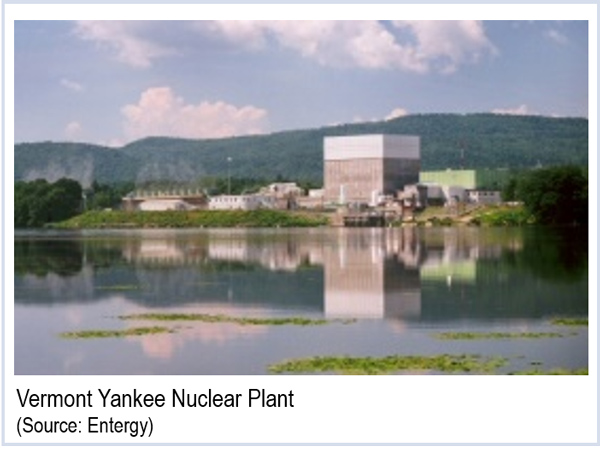By William Opalka

The 615-MW plant in Vernon, Vt., which went on line in 1972, retired Dec. 29 after a protracted battle with state government and environmentalists.
Marcia Blomberg, a spokeswoman for ISO-NE, said that a 2012 study concluded that New England would have enough generation without the plant.
“But the loss of other non-natural gas generation throughout the region is causing concern about long-term reliability,” she said. “This generation is most likely to be replaced by natural gas, which will only exacerbate our dependence on that resource.”
The nuclear plant’s loss has been compounded by other recent and planned closures in New England. The 352-MW Norwalk Generating Station in Connecticut closed in 2013 and the 720-MW Salem Harbor Generating Station in Massachusetts shut down last spring. The 1,557-MW Brayton Point plant in Massachusetts is scheduled to retire in 2017.
New England now gets about half of its generation from natural gas, meaning generators are increasingly competing against heating load for gas in a region with limited pipeline capacity.
The switch to natural gas was what led to Vermont Yankee’s closure, according to Entergy. In its August 2013 announcement of the plant’s demise, it cited “a transformational shift in supply due to the impacts of shale gas, resulting in sustained low natural gas prices and wholesale energy prices.”
It also cited Vermont Yankee’s high cost structure and the costs of regulatory compliance on a small plant. Decommissioning is expected to last decades and cost more than $1.2 billion.
The plant employed more than 600 people with about one-half of those retiring or laid off by Jan. 19. Entergy will provide $10 million in economic development aid for Windham County over five years and $5.2 million in clean-energy development funds.
Entergy’s decision accomplished what state officials and environmentalists were unable to do.
Vermont passed legislation to force the plant’s closure, but Entergy successfully challenged that move in federal court. The court ruled the state lacked jurisdiction, as nuclear power was primarily licensed and regulated by the federal government.


